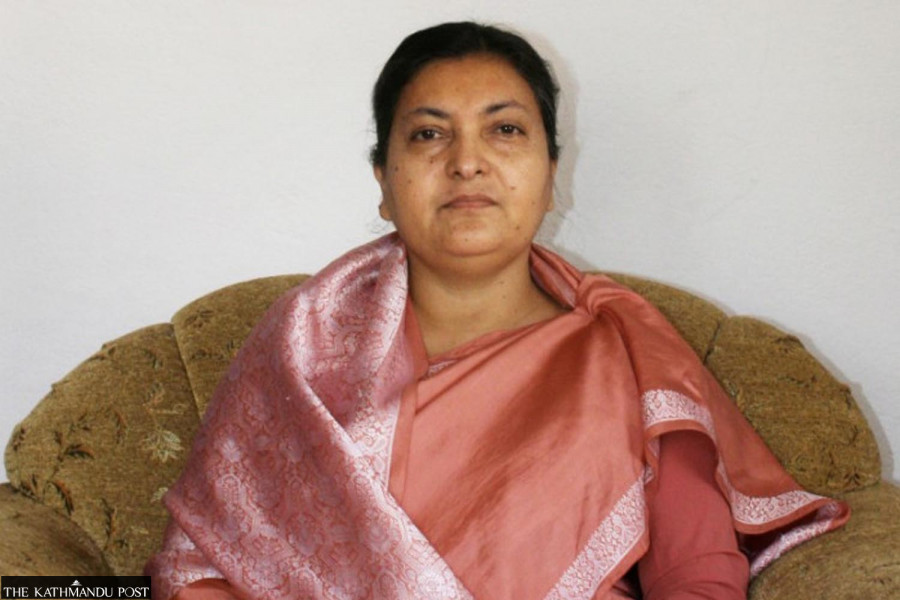National
US rights group says President Bhandari’s inaction deprived many Nepalis of citizenship
The Human Rights Watch expresses concerns over lack of progress in transitional justice process.
Post Report
An international human rights group has said President Bidya Bhandari’s refusal last year to endorse an amendment to the Citizenship Act has deprived thousands of Nepalis of citizenship.
In its global report released on Thursday, the New York-based Human Rights Watch said if the amendment was approved by the President, the law could open doors for thousands of people to acquire citizenship. “A new citizenship Act [amendment to the Act] was passed by Parliament in September, but President Bidya Bhandari refused to endorse it,” reads the report by the human rights watchdog.
The bill to amend the Citizenship Act was forwarded to the President’s Office for authentication on July 31 last year after endorsement by both the Houses of the federal parliament. However, she returned the bill to the House of Representatives with a 15-point comment for reconsideration.
The bill was again endorsed by both Houses but without incorporating her concerns. As a result, Bhandari refused to abide by her constitutional obligation to authenticate it within 15 days of receipt.
Along with the citizenship, the report talks about issues of impunity and the failure of successive governments in advancing the transitional justice process. It has said the authorities have failed to end impunity for ongoing abuses by security forces. “Deaths caused by excessive or unnecessary force while policing protests, as well as deaths in custody and allegations of torture, are rarely if ever credibly investigated, nor are perpetrators brought to justice,” according to the report.
It has raised questions over the government’s commitment towards taking actions in the cases of custodial deaths and highhandedness of the police authorities.
On May 18, a 20-year-old Dalit man, Sundar Harijan, died in Rolpa under suspicious circumstances. Though he was due to be released in 2020, he was instead transferred to Rolpa, where at the time of his death he was serving the sentence of another man convicted of offences related to organised crime, who had been released in his place. A Home Ministry investigation implicated prison officials in swapping the two men’s identities and indicated that there may be suspicious circumstances in Harijan’s death.
However, the report was not published and no action announced, according to the Human Rights Watch. Similarly no action was taken in the death of an 18-year-old woman, Nabina Tharu, in Bardiya district on June 6 who was killed when police used tear gas and live ammunition against villagers who had blocked a highway to demand the government do more to protect them from wild animals from a nearby national park, it said.
The rights watchdog has said the failure of successive governments to amend the law is a key reason that there has been no progress in delivering justice and accountability for conflict-era violations since a 10-year Maoist insurgency ended in 2006.
The amendment bill to the Enforced Disappeared Enquiry, Truth and Reconciliation Commission Act registered at the Parliament Secretariat had some positive aspects, including on the right to reparation and interim relief for victims who were left out of earlier programmes.
“However, it also contained provisions that would hinder accountability, making it difficult or impossible to prosecute those responsible for serious violations including war crimes and crimes against humanity. Other provisions that violate international law include limitations on the right to appeal,” reads the report.
Nepal has a mixed record on lesbian, gay, bisexual, and transgender rights, according to the report. In some ways, its legal progress has been exemplary for the region, but implementation remains inconsistent. In 2007, the Supreme Court called for legal recognition of transgender people based solely on their self-identification, but some authorities continue to demand proof of surgeries. The court also mandated a study on equal marriage rights for same-sex couples, but the 2018 criminal code only recognizes marriages between men and women.
“In recent years LGBT rights activists have filed a series of writ petitions at the Supreme Court challenging the government’s failure to uphold the rights of transgender people in practice, but the cases have all faced delays at the court,” said the Human Rights Watch.




 8.79°C Kathmandu
8.79°C Kathmandu














